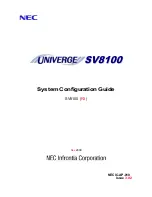
Setup
Document No. D109-010
Page 40 of 108
Revision 1.15
NOTE:
It is the user’s responsibility to ensure that the Logix tag datatype/UDT
and size matches that of the DNP3 message requests. Failing to do this can
cause unexpected results and communication faults.
A list of recommended data types for each Group – Variant combination is
listed in Appendix A.
3.5.3.
U
NSCHEDULED
M
ODE
There is no additional configuration required when using the Unscheduled Mode. The
configuration required for the DNP3 message is contained within the Message Block data,
configured in Logix. Refer to the operation section for more information.
NOTE: The DNP3 Secure Authentication is not supported in the Unscheduled
mode.
3.6.
DNP3 EVENTS
3.6.1.
R
EACTIVE
M
ODE
(DNP3
O
UTSTATION
)
When in Reactive Mode the DNP3 Router provides the ability to log various DNP3 elements
and commands. The following parameters must be configured to enable DNP3 Events.
Parameter
Description
Enable Events
This parameter will enable or disable the DNP3 Event function for a specific set
of DNP3 elements (configured in the same line item)
Event Variation
For each DNP3 Group there are various combinations of DNP3 Event variations
that can selected. These event variations will be used to log the default event
format for when default event requests are used.
Deadband (DB)
The deadband is used to determine when to log an event for Counters, Analog
Inputs, and Analog Outputs Status. If the value changes by more than the
deadband an event is logged with the specific DNP3 element’s value.
Table 3.7 – Event logging parameters for the DNP3 Router
NOTE: DNP3 elements will always be logged when any status bit changes (e.g.
Online, Restart, etc.).
NOTE: When using Binary Groups (e.g. Binary Inputs, Double Binary Inputs, and
Binary Output Status elements will be logged whenever there is a change in
any value (status or process value).
















































